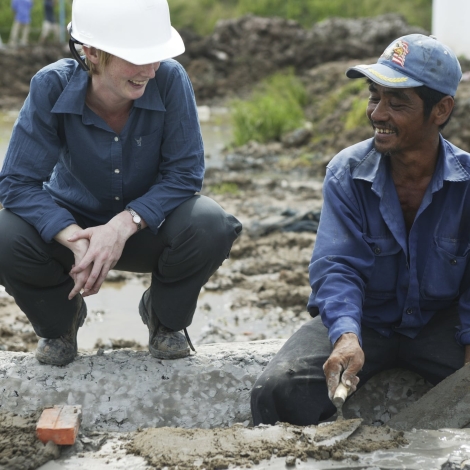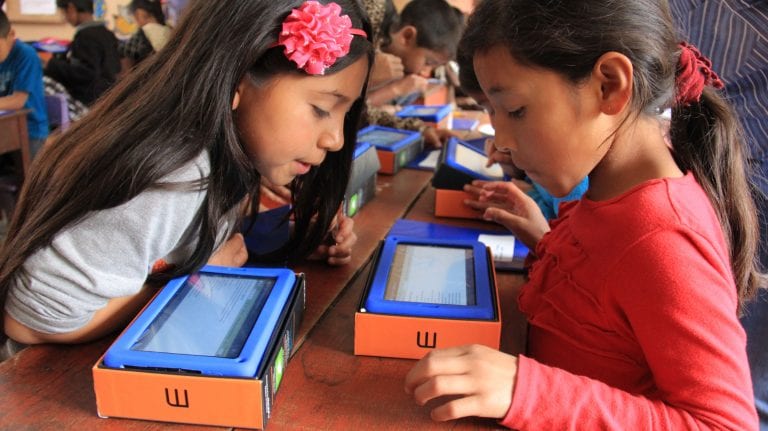One of the biggest threats we face as engineers working in global development is not lack of funding, and not too many problems in which we don’t know where to start, but “voluntourism.” Voluntourism is where people travel to a resource-constrained region to do work that they aren’t necessarily qualified to do. The problem is insidious in service learning in engineering education, which I’ll get to. First, let’s look at why voluntourism is a threat.
“There is some sort of opening ceremony and the community gives thanks for the great and wise intervention from western volunteers. Everyone is happy, so what is the problem?”
A typical example is where relatively well-off citizens from Australia, Europe, or North America travel to an impoverished community in Africa, Asia or South America and help build an orphanage or school. They work from dawn to dusk in sweltering conditions doing manual labor, under the supervision of someone who is qualified, or “has done the work before.” At the end of the project, there is a new orphanage or school and something for which the volunteers can be proud. There is some sort of opening ceremony and the community shows their thanks for the great and wise intervention and support from western volunteers. Everyone is happy, so what is the problem?
The problem is that there was no transfer of knowledge—no capacity building. Capacity building is essential in humanitarian and development work. The adage about fishing applies: “Give a person a fish, they will eat for a day; teach a person to fish, they will eat for a lifetime.” A bunch of volunteers traveling halfway across the world to learn how to anecdotally fish and then give those fish to a community isn’t capacity building. The community still can’t fish. They haven’t learnt anything useful from the processes. They become reliant and dependent on other people. More cynically, a lot of money has been spent on flying dozens of people halfway across the world; money that could be better used if the ultimate aim is to help the communities.
“An accountant volunteering to help a small business develop better financial systems is good. An accountant digging a trench is bad.”
Rather than flying somewhere to dig a trench, or paint a wall, why not give that money to the community directly and pay them to dig and paint? So much more could be done that way. But the voluntourists do not get their hands dirty and do not have that warm fuzzy feeling. They don’t want to just be a donor, they want to be integral to the solution, and that is selfish. Both can be achieved IF the volunteer is contributing in a way that others cannot. An accountant volunteering to help a small business develop better financial systems is good. An accountant digging a trench is bad.
I’m thinking about the spreading phenomenon of voluntourism now that the dust has settled and I can look back and reflect on a conference, the 2017 IEEE Global Humanitarian Technology Conference, held in San Jose, California (USA) in October last year. The event confirmed that there is a growing appetite for this work: for industry to more efficiently develop appropriate technology solutions, government wanting to understand how better to deliver aid, and universities tapping into the benefits of in-country service learning for students. In one session at GHTC, a number of universities discussed their service-learning programs. This is something in which I’m passionately involved, and fully aware of the difficult balancing act between student benefits and community benefits. I noticed that some programs were good, while some risked falling into the voluntourism trap. But is voluntourism a bad thing when the tourists are students and they are learning lessons? Personally, I think it is bad, but I am happy for discussion.
“Is voluntourism a bad thing when the tourists are students and they are learning lessons? Personally, I think it is.”
Without too many specifics, I will share a good example and bad example of service learning. If you send nursing students to a resource-constrained community, they will be able to directly help communities and do work that others cannot. These students have learned skills that aren’t easily transferable. This is good for the students and good for the community. I believe this is what universities should aspire to provide. However, if you send engineering students to a community to dig trenches, you risk voluntourism. The latter relies on the same logistics, consuming the same resources of academic administration, travel expenses and so on. But instead of sending trained healthcare workers, you are effectively paying to fly unskilled construction laborers into a community that already has untrained laborers ready to work.
In that latter scenario, most of the benefit goes to the engineering students. The engineering students learn to do something that they wouldn’t necessarily do in their engineering careers back home, but there is no capacity building in the community where they work. You could even argue that the students are taking jobs away from local laborers who might have been paid to dig trenches if not for the arrival of a foreign trench-digging crew. A slight modification would solve the problem. If the engineering students help manage a project and mentor community members, then knowledge is transferred, capacity is built and the system works.
“It isn’t easy. If it was, there would be more successful models of service learning than unsuccessful ones, and voluntourism wouldn’t exist.”
It is a difficult balancing act for universities. A building site only needs one project manager, and so you only really need to send one student. That is too limiting for the university. The balancing act is to send enough students to carry out projects in foreign countries were they can apply their knowledge, but to also build capacity in the communities. It isn’t easy. If it was, there would be more successful models than unsuccessful ones, and voluntourism wouldn’t exist. As a community of practitioners, academics and industry and government representatives, we need to make sure our good intentions are used as best as possible. This needs open honest conversation, a willingness to change, and a willingness to perceive.
And one more note on GHTC: In an attempt to reduce my carbon footprint, I may not be at the 2019 GHTC, but as far as conferences go, I feel like I get the most out of this one because of the people, because of their willingness to have honest conversation and because of an ability to question my way of thinking.
About the Author
Dr. Cris Birzer is a Chartered Professional Mechanical Engineer and Senior Lecturer in Sustainable Energy Engineering at the School of Mechanical Engineering at the University of Adelaide (Australia) and also an Associate Editor for the Journal of Humanitarian Engineering.
The views expressed on this page are those of the author and do not necessarily reflect those of Engineering for Change, the American Society of Mechanical Engineers, or any other person or entity associated with this organization.


Very good article Cris! And very true, I can support this from the bottom of my heart…
I disagree strongly.
Getting people with money to visit people without much is the goal, not building some out house. Volunteers are the product, as they go home and donate so that what they did on an outing can be funded without them.
Spot on, I am from developing country, I had same thought before when I saw foreign engineerng students who can have a lot to offer, trimming/prunning trees in a school compound, using power hacksaw. Something local do without using power/ fuel.
Thanks David. I think it is a balance between feeling good and doing good.
Hi Muhamed,
Thanks for the feedback, especially from someone who has seen the issues first-hand.
Hi Tommy,
Tourism is a really important way of improving the quality of life of those in developing communities. Similarly, volunteering using difficult-to-transfer skills also has a big impact in raising quality of life. However, voluntourism is not a positive hybrid of the two. For example, someone pays $2000USD + flights for the “privilege” to work in a developing community, where they will help build a house. Most of the money will go to materials, accommodation, in-country travel, food and administration fees (in that order), plus their flights as well. Typically, a group of volunteers will have cheap, potentially self-cooked meals, and live in cheap accommodation (and in cases I’ve seen, away from the community that will be helped). They do this to save costs so that their funds have more of an impact (ie buy more materials). Then they spend all their time building the house, even if they aren’t skilled to do it.
If the goal is for people with money to visit those without much, that is, tourism to the community in question, why don’t they spend the $2k living with the community, paying locals to cook, pay for tours, tourist gifts and trinkets? If the aim is to raise funds and build a house, why fly there in the first place and not just donate ALL the money (including that for flights) to the community for materials and education so they can build their own house? Both tourism and volunteering are important, but voluntourism decreases the impact of both, plus fails to train the community to be self sufficient. A balance can be found, but it isn’t easy.
Interesting take on the three things, Cristian. It seems like there is a value in volunteering time in addition to donating money, and that’s probably the driving force behind “voluntourism.” But after thinking of it from your point of view, maybe the best use of money might be to send it directly to an organization working in the country that you’d like to help, like you said. And maybe the best use of volunteer time might be to volunteer in your own city or your own country. There are homeless people who can use a home in every country and volunteers itching to build homes for the less fortunate might consider looking next door rather than to a foreign country.
Completely agree with you Rob!
Best technical article I have ever read…best luck !!!
This is very important and valuable. How can i join this program
.
Voluntourism will help us to know what was really going on right out there and it makes us to improve some knowledge and working skills. engineering for CHANGE was doing a fabulous job in all aspects
Hi Praveensagar311! Going to a place to monitor and observe helps ensure opportunities are suitably identified and solution implementation is achieved appropriately. Going somewhere and learning how communities operate, even trying to do the same work to “walk in their footstep” is a great way of empathizing and understanding (plus learning new skills). However, going somewhere and taking away work opportunities from local communities members is the issue. You don’t need to travel to a resource-constrained community to learn how to dig a foundation trench, place the reinforcement steel, or mix and pour concrete. It would be better to ensure communities members learn those skills, so they can then increase their opportunities. It is about what you get AND what community members get (or don’t get).